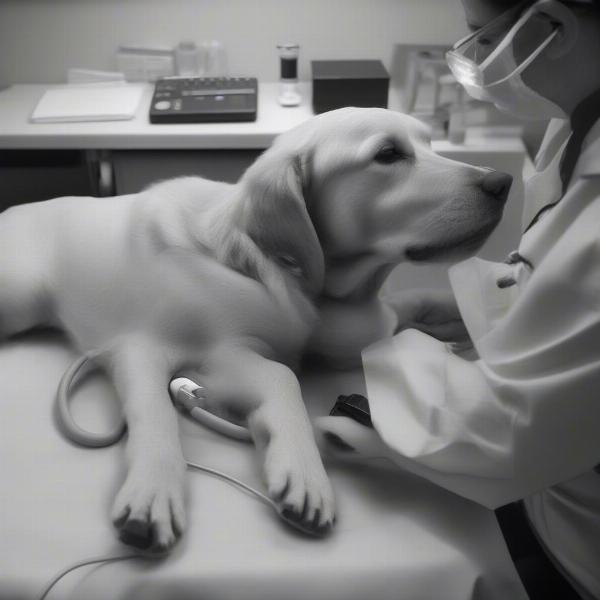A dog sonogram, also known as a canine ultrasound, is a valuable diagnostic tool used by veterinarians to examine a dog’s internal organs and tissues. It’s particularly useful during pregnancy to monitor the development of puppies and assess the mother’s health. Understanding what a dog sonogram is, how it works, and what information it can provide can help expectant pet parents feel more prepared and informed throughout their dog’s pregnancy.
What is a Dog Sonogram and Why is it Important?
A dog sonogram uses high-frequency sound waves to create images of the inside of your dog’s body. Unlike X-rays, sonograms don’t use radiation, making them a safe option for pregnant dogs and their developing puppies. They provide real-time images, allowing veterinarians to observe movement and function of organs, such as the heart and kidneys. During pregnancy, a sonogram can confirm the pregnancy, estimate the number of puppies, assess fetal viability, and monitor the overall health of both the mother and her litter.
 Dog Sonogram During Pregnancy
Dog Sonogram During Pregnancy
When Should a Pregnant Dog Have a Sonogram?
Typically, the first sonogram is recommended around 28 days after breeding. This allows the veterinarian to confirm the pregnancy and get an initial estimate of the litter size. Follow-up sonograms may be scheduled later in the pregnancy to monitor fetal development, assess fetal heartbeats, and check for any potential complications. Your veterinarian will advise you on the appropriate timing and frequency of sonograms based on your dog’s individual needs.
What to Expect During a Dog Sonogram Appointment
The procedure is generally non-invasive and painless. Your dog will usually lie on her side while the veterinarian applies a conductive gel to her abdomen. The ultrasound probe is then gently moved over the skin to capture images of the internal organs and the developing puppies. The entire process usually takes around 30-60 minutes.
How to Interpret the Results of a Dog Sonogram
Your veterinarian will explain the findings of the sonogram. They’ll be able to identify the number of puppies, assess their heartbeats and movement, and check for any abnormalities. They can also evaluate the placenta and uterus for any signs of infection or other issues. It’s essential to discuss any concerns or questions you have with your veterinarian.
Benefits of Dog Sonograms Beyond Pregnancy
While commonly used during pregnancy, dog sonograms also play a crucial role in diagnosing various medical conditions unrelated to pregnancy. They can help identify tumors, bladder stones, abdominal masses, and other internal abnormalities. The versatility of this diagnostic tool makes it an essential part of veterinary care.
Can I perform a sonogram on my dog at home?
While at-home ultrasound devices exist, they are generally not recommended for use by non-professionals. Interpreting sonogram images requires specialized training and experience. An inaccurate interpretation can lead to delayed diagnosis and treatment. It’s always best to consult with a qualified veterinarian for accurate diagnosis and treatment.
What if my dog’s sonogram reveals a problem?
If the sonogram reveals any issues, your veterinarian will discuss the best course of action. This may involve further diagnostic tests, medication, or even surgery. Early detection through sonograms often leads to better outcomes, highlighting the importance of this diagnostic procedure.
Conclusion: The Value of Dog Sonograms in Canine Care
Dog sonograms are an invaluable tool in veterinary medicine, providing crucial insights into a dog’s health, especially during pregnancy. From confirming pregnancy and monitoring fetal development to diagnosing various medical conditions, sonograms offer a safe and effective way to ensure the well-being of your canine companion. By understanding the purpose and benefits of dog sonograms, you can be a more informed and proactive pet parent.
FAQ
- How much does a dog sonogram cost? The cost varies depending on the clinic and the complexity of the procedure. It’s best to contact your veterinarian for specific pricing information.
- Is a dog sonogram painful? No, the procedure is typically painless. Some dogs may experience slight discomfort from the pressure of the probe, but it’s generally well-tolerated.
- How early can a dog sonogram detect pregnancy? A pregnancy can usually be confirmed around 28 days after breeding.
- Do I need to prepare my dog for a sonogram? Your veterinarian may provide specific instructions, but generally, no special preparation is required.
- Can a dog sonogram harm the puppies? No, dog sonograms use sound waves, not radiation, and are considered safe for both the mother and the puppies.
- How often should a pregnant dog have a sonogram? The frequency depends on your dog’s individual needs and any potential complications. Your veterinarian will advise you on the appropriate schedule.
- What are the signs of pregnancy in dogs? Signs can be subtle and may include increased appetite, weight gain, enlarged nipples, and changes in behavior.
ILM Dog is a leading international pet website dedicated to providing expert advice on all aspects of dog care and wellbeing. From breed selection and puppy care to senior dog health and training, we offer a wealth of resources to support dog owners worldwide. Our team of experienced writers and dog experts are committed to delivering reliable, practical information to help you provide the best possible care for your canine companion. Learn more about our services and expert advice on dog sonograms by contacting us at [email protected] or calling +44 20-3965-8624. Visit ILM Dog for more information on dog health, training, and care.